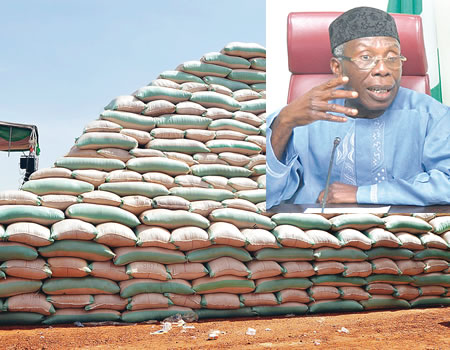Rice is a food produce that cuts across all tribes in Nigeria. Virtually every household eat rice almost on a daily basis and the demand for the staple is high, often higher than the quantity available. This led to the agricultural sector in the country paying attention to rice production to reduce the millions of naira used on importation of the product.
AA Chairman rejects Uche Nwosu as Imo Guber candidate
And as the demand for rice increases in Nigeria and rice production continually rose reaching over 15 million metric tonnes annually, rice farming also became prominent across states in Nigeria and as demand soars, government continued making concerted efforts to promote local production of rise.
In spite of these efforts, rice importation in Nigeria continues to consume millions of naira. And this and other issues like unavailability of sacks to bag the rice and other challenges of rice production and distribution, makes the rice of rice go up and down at will.
And as Christmas approaches, stakeholders have expressed the fear that Nigerians may not have a rice-filled Christmas due to expected soar in price of rice. This according to rice sellers may be a source of hardship as rice is the food produce that is in highest demand throughout the year and most especially during the yuletide.
“I can comfortably tell you that as a foodstuff seller, the quantity of rice I have sold this year is more than triple other types of produce. Rice is such high demand and now that it is December, the demand will skyrocket. You know rice is what many cook and distribute to family and friends for celebration, it is also used as gifts and Christmas hamper, so the demand will definitely increase. The fear now is also that the price will rice and it will become expensive for many to buy.
‘This is expected but it is not good for us as business people. You know that the economic situation in the country is not friendly, increase in price of rice now is a big hardship but like I said, it is expected,” Madam Ibiloye Mary, a rice distributor told Nigerian Tribune.
Indeed, price fluctuation seems to have been synonymous to rice for a while. In May, a 50kg bag of parboiled rice was sold for N12, 000 but by June it was sold between N13, 000 and N15, o00, depending on the area and the brand. But now, a 50kg bag of rice costs between N18, 000 and N21, 000 with expectations of a hike in a few days time.
Marketers say that the upcoming yuletide celebration has caused hoarding and panic buying among some distributors who want to have enough at the current price, adding that such acts will further make the price situation worse.
But this prophesied hike is actually not unexpected as market watchers had predicted months back that by Christmas, the price of rice will rise. A guest contributor on Legit.ng, Samuel George, as far back as the second trimester of the year predicted that price of rice will increase by December; his prediction was during the period when the price of rice had crashed and there seems to be enough supply in the country.
He had opined that the price of rice will continue to increase and it may well sell at over N20, 000 by Christmas. Indeed, some parboiled rice now sell for N20, 000 at present like he predicted and it seems, that is not the benchmark as there is still expectation of hike in price by the middle of the month.
Some rice marketers attribute the hike in price of rice to the ban on importation which makes most products smuggled and expensive. “The ban by government is not all positive, though it will encourage local production but the truth is that rice is in high demand and what is being produced in the country cannot meet up with the demand. So people spend so much smuggling rice in and they sell it at expensive rates because all the cost they incur is added. This is why rice is expensive, it is a food in high demand,’ Olaiya Tosin, a rice seller at Bodija market stated.
Some also attributed hike and fluctuating price of rice to the activities of big importers that have monopolised the market. “The price of rice as a commodity will continue to rise and fluctuate for long time to come. It cannot be otherwise; aside the fact that the ban by government affects price, some people who have monopolized the market are a challenge because they determine price according to their whims and interests,” a retail seller who spoke to Nigerian Tribune on a condition of anonymity stated.
Many believe that the ban is a major factor in the hike and fluctuating price of rice, arguing that though importation of rice has been reduced drastically by the Federal Government ban, the locally produced rice is not sufficient to meet local demands and consequently more that 75 per cent of rice consumed is still imported and prices are consequently determined by smugglers depending on how easy they find it easy to bring in the smuggled products.
Though government claims that the current yield per hectare of rice increased from 2.5million tonnes in 2005 to 3.5 million tonnes in 2010 and 5.5 million tons in 2018, it is still below what is needed to ensure food security in the nation considering the appeal rice has across the tribes in the country.
This is contrary to the status of the country as the largest producer of rice in West Africa. Though it also ranks as the second largest importer of rice in the world as at 2017 and is said to incur an average import bill of a billion naira daily on rice importation.
The consensus among market watchers and stakeholders is that the price of rice will continue to increase especially with the approaching yuletide and beyond except the Federal Government can introduce people-oriented policies.
And as market indices indicate a steep hike in price of rice, the Christmas may not be a rice-filled one for Nigerians this season.






